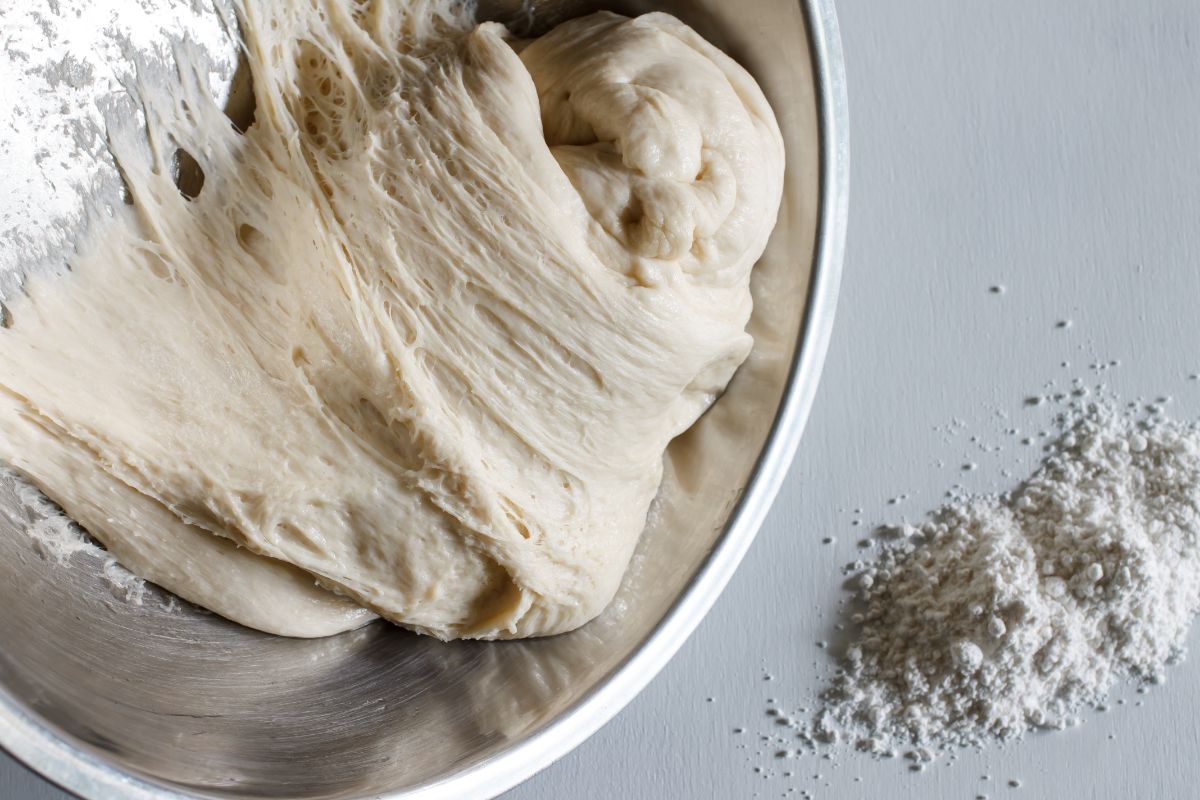Dough is a simple mixture of flour and ingredients such as milk, eggs, and yeast. Although most of the time we bake fresh dough that has been recently prepared, there may be times that we need to store it before use.
Storing dough leads to the inevitable question of how long dough lasts. Is it possible for dough to go bad and become unsafe for use?
The answer to this is yes! If you are going to store dough before baking dough, you need to be careful about how long and how you keep it.
In this article, we will look at how long does dough last and how you can tell whether dough has gone bad. We will also give hints and tips to keep your dough fresh for as long as possible.
Does Dough Go Bad?
All types of dough will eventually go bad but how long it takes depends on the type of dough and the ingredients in the dough.
Most standard types of dough are made just with flour, water, and yeast. Many simple types of bread dough are based on just these ingredients.
This basic dough can last for a long period, especially if it is kept in the fridge.
Many bakers like to leave bread dough as it allows the dough to rise slowly, the yeast to work, and the fermentation process to occur more slowly.
This is the case for sourdough bread dough as well as this is best when left to rise for extended periods.
Other types of dough such as pizza dough also benefit from being left for up to five days before baking. If your dough uses eggs and milk with flour and yeast, you can put this in the fridge, too.
If you decide to freeze your dough in the freezer, you can leave it for up to three months before use. Longer than this can cause freezer burn and visible freezer crystals to form, however.
How To Tell If Bread Dough Has Gone Bad
Although many types of dough are long-lasting, they can still become bad. Homemade dough doesn’t have an expiration date but here are some tips to help you tell.
Bad Smell
This is the easiest way to if your dough has gone bad. If your dough smells rancid, then you know that you shouldn’t use it.
Raw dough and sourdough starter ferments and as it begins, it may smell like alcohol. This is a natural smell and part of the process. It’s a sign that the yeast is doing its work.
However, if your dough has a foul smell that is similar to cheese, then this is one of the most obvious signs that your dough shouldn’t be used. It means the yeast activity has progressed too far.
Dough that uses milk, eggs, or other dairy products will have a much stronger smell when it has gone bad.

Mold
If you spot even the smallest amount of mold on your dough, you should throw it away immediately. This is a sure sign that harmful bacteria are in your dough.
Don’t be tempted to simply cut the moldy dough away and don’t risk eating the rest!
If you leave your dough at room temperature for too long, you run the risk of mold growth.
Forgotten dough that has been left out of the fridge or freezer can become bad quickly, especially in warmer climates, so make sure you store it correctly.
Texture Or Color Change
Once you’ve made dough a few times, you will get a second sense of how your dough should feel and look.
Whether you’ve made standard dough or cookie dough, it should always feel and look the same.
If you notice that your dough feels wetter than it should or if it is dry or cracked, this is a sign that it might have gone bad. The same is true if you find any gray spots.
You can check the dough if you’re not sure by baking a little piece of it in the oven. However, we recommend caution and even if you rarely throw dough away, it is better to be safe than sorry.
How To Store Dough
If you are not going to use your dough immediately, you can extend its shelf life in the fridge or freezer.
Fridge
If you only want to store your dough for a short period, then you can use a fridge. You can store your dough in the fridge overnight or for a few days.
Pick an airtight container that is larger than your dough. This will aid the rising process. If your recipe calls for a second rise or final rise, the dough will have room to do this.
We recommend putting pizza dough in the fridge before you use it every time!
Freezer
Make sure your dough is tightly wrapped in plastic wrap or an airtight freezer bag. This will prevent it from absorbing flavors from over food in the freezer.
Frozen dough should be used within three months. If you leave it for longer, it can get freezer burn.
Room Temperature
We do not recommend storing dough at room temperature. It will be fine for a short period such as two hours, and at cold temperatures can be left for a little longer.
You should not leave dough out of the fridge for long though so it’s best to put the dough in plastic wrap and place it in the fridge.
Final Thoughts
In this article, we took a closer look at whether dough can go bad and the factors that can make dough go bad.
We also gave a few tips on how to extend the shelf life of your dough, many of which will ensure your dough rises perfectly.










